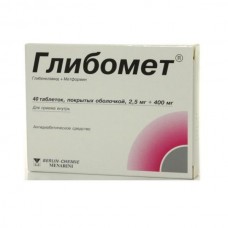Expiration date: 02/2025
The composition and form of issue:
Tablets, film-coated. 1 tablet contains:
glibenclamide 2.5 mg
Metformin hydrochloride 400 mg
excipients: microcrystalline cellulose starch corn silicon dioxide highly dispersed gelatin glycerin talc magnesium stearate acetate-phthalate cellulose diethyl
blistere in 20 PCs in a carton 2 blisters.
Description pharmaceutical form:
Round, white, convex tablets, film-coated, scored for division one side.
Feature:
Combined hypoglycemic agent, contains sulfonylurea derivative II generation and derived biguanide.
Pharmacological action:
Glibenclamide stimulates insulin secretion by reducing the threshold of stimulation by glucose beta cells of pancreas, improves insulin sensitivity and the degree of its binding to target cells, increases insulin release, enhances insulin action on glucose uptake by muscle and liver, inhibits lipolysis in adipose tissue. Operates in the second phase of insulin secretion.
Metformin — inhibits hepatic gluconeogenesis, decreases absorption of glucose from the digestive tract and promotes its utilization in the tissues, reduces triglyceride and cholesterol in blood serum. Increases insulin binding to receptors (in the absence of blood insulin therapeutic effect is not evident). It does not cause hypoglycemic reactions.
Pharmacokinetics:
Glibenclamide quickly and adequately (84%) absorbed in the digestive tract. The time to reach Cmax for 7-8 h. the plasma protein Binding is 97%. Almost completely metabolized in the liver to inactive metabolites. 50% is excreted by the kidney and 50% in the bile. T1/2 — 10-16 h
Metformin after absorption in the gastrointestinal tract (absorption — 48-52%) is excreted by the kidneys (mostly unchanged), partly by the intestines. T1/2 is 9-12 h.
Description pharmacological action:
Hypoglycemic effect develops in 2 hours and lasts for 12 h
Indications:
Diabetes mellitus type 2 (insulin-independent) in case of failure of diet alone or oral hypoglycemic agents.
Contraindications:
Hypersensitivity to the drug, diabetes mellitus type 1 (insulin dependent), hypoglycemia, diabetic ketoacidosis, diabetic precoma and coma, pregnancy, lactation, lactic acidosis (in history), severe disease, accompanied by a decrease in liver and/or kidney and/or hypoxic condition.
Application of pregnancy and breast-feeding:
Contraindicated. At the time of treatment should stop breastfeeding.
Side effects:
From carbohydrate metabolism: possible hypoglycemia.
From the digestive tract and liver: rarely — nausea, vomiting and in some cases — cholestatic jaundice, hepatitis.
On the part of the blood: rare — reduction in the number of platelets, leukocytes, erythrocytes in some cases of hemolytic or megaloblastic anemia.
CNS: headache, dizziness, weakness, and paresis, sensitivity disorders.
Allergic and immunopathological reactions: rare — urticaria, fever, joint pain, the appearance of protein in the urine.
From the skin: rarely — increased sensitivity to light.
From the metabolic: may increase blood lactate.
If you have symptoms of lactic acidosis (vomiting, abdominal pain, weakness, muscle cramps), you need to stop taking the drug and immediately consult a doctor.
Drug interactions:
Hypoglycemic effect increases difenacoum (including its derivatives), beta-blockers, cimetidine, oxytetracycline, allopurinol, MAO inhibitors, sulfonamides, phenylbutazone (including its derivatives), chloramphenicol, probenecid, salicylates, miconazole (oral forms), sulfinpirazon, alcohol (in large quantities) weaken the adrenaline, corticosteroids, oral contraceptives, thyroid hormones, casinosolera diuretics, barbiturates. May increase effect of anticoagulants.
Concomitant use with cimetidine may increase the risk of developing lactic acid acidosis.
Method of application and dose:
Inside, during a meal. The dosage is determined individually, depending on the status of carbohydrate metabolism and blood sugar levels. The initial dose 1-3 table. a day with a gradual selection of the dose to achieve stable compensation of the disease. Optimal mode is considered the drug 2 times a day (morning and evening). It is not recommended to take more than 5 table. Glibomet per day.
Special instructions:
The treatment is carried out only under the supervision of a physician.
While taking the drug should follow a diet and to carry out self-monitoring of blood sugar levels.
Glibomet
(Glibenclamide
+
Metformin)
2.5mg
+
400mg
40
tablets
- Brand: Berlin-chemie

- Availability:
in stock
Categories:
-
$13.60

